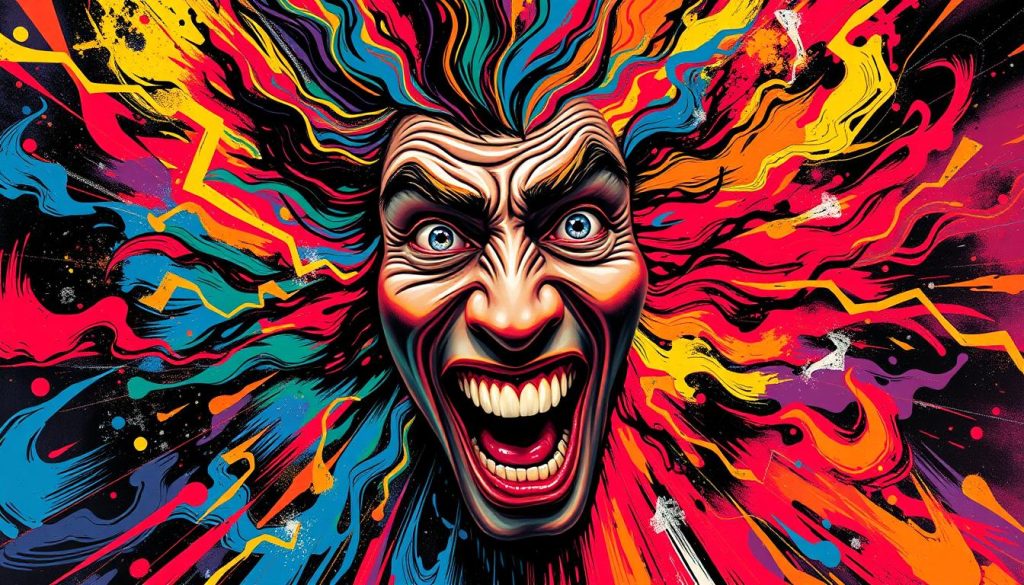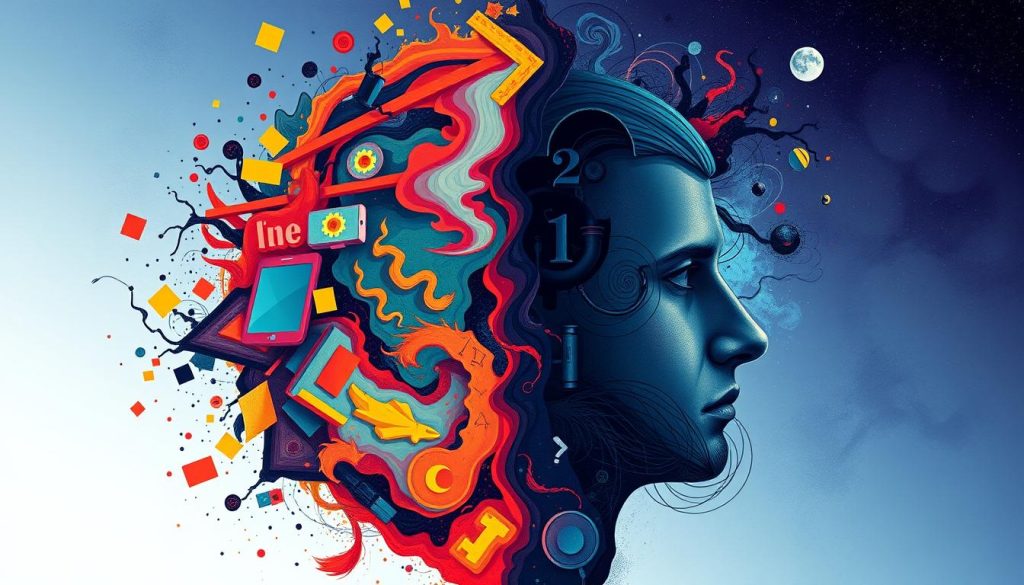Manic depressive bipolar disorder is a mental health condition known for its ups and downs. It’s also called bipolar depression. This disorder has episodes of mania and depression, each with its own set of challenges and symptoms.
Understanding manic depressive bipolar helps individuals and their loved ones deal with its emotional ups and downs. The National Institute of Mental Health (NIMH) says it affects millions. It usually starts in late teens or early twenties.
But, manic depressive disorder is not the same for everyone. It comes in different forms, each needing a special approach to treatment and support. The World Health Organization (WHO) stresses the need for more awareness and help for those affected.
We aim to make manic depressive bipolar disorder less mysterious. We’ll explore its symptoms, history, and how education can offer hope.
Key Takeaways
- Manic depressive bipolar disorder consists of oscillating episodes of mania and depression.
- Recognizing the symptoms of bipolar depression is crucial for seeking timely and appropriate support.
- Each manifestation of manic depressive disorder necessitates a different therapeutic strategy.
- Global organizations like the NIMH and WHO emphasize the importance of resources and awareness for affected individuals.
- Educational exploration can provide a pathway to empathy, support, and a better quality of life for those with bipolar disorder.
What is Bipolar Disorder?
Bipolar disorder is more than just a mood disorder. It’s a complex condition that affects mood, energy, and activity levels. These changes can make everyday life very hard. Knowing about bipolar disorder, its types, and symptoms is key for both patients and doctors.
Definition of Bipolar Disorder
The DSM-5 defines bipolar disorder. It says the condition is marked by manic or hypomanic episodes followed by depression. This back-and-forth makes it hard to diagnose and treat.
Types of Bipolar Disorder
- Bipolar I Disorder: This involves severe manic episodes and sometimes depression.
- Bipolar II Disorder: People with this type have depressive episodes and hypomanic episodes, but not full manic episodes.
- Cyclothymic Disorder or Cyclothymia: It’s a milder version, with periods of hypomania and mild depression, but not severe enough for a diagnosis of hypomania or major depression.
Key Symptoms
| Type | Manic Symptoms | Depressive Symptoms |
|---|---|---|
| Bipolar I | High energy, decreased need for sleep, unusually elated mood | Prolonged sadness, withdrawal from activities, fatigue |
| Bipolar II | Increased activity levels, excessive enthusiasm, risky behavior | Low self-esteem, hopelessness, changes in appetite |
| Cyclothymia | Moderate increase in energy and productivity | Mild sadness, decreased motivation |
To wrap it up, knowing the different types of bipolar disorder and its signs is vital. Each type has its own challenges, affecting treatment and results.
Historical Context of Bipolar Disorder
The story of manic depressive bipolar history starts with old ideas and moves to today’s advanced medical knowledge. These changes have been key in shaping how we deal with mental health today.
Early Understandings in Medicine
Long ago, doctors noticed the big mood swings and energy changes in bipolar disorder. From simple notes to deep understanding, we’ve come a long way. Ancient Greek doctors like Hippocrates wrote about symptoms that sound like today’s bipolar disorder.
Evolving Definitions Over Time
In the 19th century, big steps were made. French doctors Jean-Pierre Falret and Jules Baillarger talked about mood swings. Later, Emil Kraepelin called it “manic-depressive psychosis,” changing how we see it.
Now, we have clear types of bipolar disorder. We know about bipolar I, II, and more. This shows how much we’ve learned about it.
Influential Figures in Psychiatry
Doctors like Kraepelin have changed how we see and treat bipolar disorder. Their hard work has helped us tell different mental health issues apart. This has helped a lot in treating mental health today.

These important moments in history still shape how we treat today. Knowing where we come from helps doctors tailor treatments better.
To learn more about bipolar disorder’s history, check out WEBMD’s section on it.
| Period | Key Development | Figures Involved |
|---|---|---|
| Ancient Times | Observation of mood extremes | Hippocrates, Aretaeus |
| 19th Century | Identification of the cyclical nature of symptoms | Jean-Pierre Falret, Jules Baillarger |
| Early 20th Century | Formal naming and classification as manic-depressive psychosis | Emil Kraepelin |
The talk about manic depressive bipolar history and bipolar disorder diagnosis evolution keeps going. Modern psychiatry uses these old ideas to move forward. Each time we learn something new, we get closer to better treatments for bipolar disorder.
Differentiating Between Bipolar I and II
It’s important to know the difference between Bipolar I and Bipolar II disorders. Each has its own traits, affecting treatment and how patients feel. This knowledge is key.
Key Features of Bipolar I
Bipolar I disorder is marked by long manic episodes. These episodes last at least seven days or are so severe they need hospital care right away. Manic episodes are the main feature of Bipolar I, with depressive episodes also happening.
Key Features of Bipolar II
Bipolar II disorder is different. It mainly involves depressive episodes and at least one hypomanic episode. Hypomanic episodes are less intense and don’t usually need hospital care. The main difference between Bipolar I and II is the severity and length of manic episodes.
Mixed Episodes Explained
Mixed episodes are important in both Bipolar I and II. They make diagnosis and treatment harder. These episodes have both manic and depressive symptoms at the same time, making them tough to manage.
| Feature | Bipolar I | Bipolar II |
|---|---|---|
| Episode Type | Manic | Hypomanic |
| Duration | 7+ days or hospitalization | At least 4 consecutive days |
| Secondary Episodes | Depressive (common) | Depressive (predominant) |
| Mixed Episodes | Possible | Less severe, yet possible |
Knowing the difference helps in making a more accurate diagnosis. It also leads to better treatment plans. This tailored approach can greatly improve a patient’s life.
Symptoms of Manic Episodes
Manic episodes are a key part of bipolar disorder. They show as an overly high mood, more activity, and other symptoms that disrupt daily life. It’s important to understand and manage these symptoms well.
Elevated Mood and Energy
During a manic episode, people feel a lot more energy and do more. They might feel very happy and optimistic, and need less sleep. While this can make them more creative and productive, it can also lead to too much activity.
Impulsivity and Risk-Taking
Impulsivity is another sign of manic episodes. People might make bad choices, like spending too much money or taking big risks. This shows how judgment can change during these episodes, leading to serious problems.
Changes in Sleep Patterns
Need for sleep drops during manic episodes. People might feel refreshed after just a few hours or sleep a lot less. This can make other symptoms worse and make the episode more severe.
| Common Symptoms | Impact on Life |
|---|---|
| Elevated mood and energy | Can lead to productivity; often results in volatility and risk |
| Impulsivity and risk-taking | Might cause financial or personal loss and long-term repercussions |
| Changes in sleep patterns | Contributes to physical and mental health issues |

Symptoms of Depressive Episodes
The other side of bipolar disorder often involves depressive episodes. These episodes are a big change from the highs of manic periods. Knowing these signs is key to managing bipolar depression symptoms and finding the right bipolar disorder treatment.
Feelings of Hopelessness
Feeling hopeless is a big problem in depressive episodes of bipolar disorder. People might feel a deep sadness that doesn’t seem to have a reason. This feeling can make it hard to do everyday things.
Changes in Appetite and Sleep
Depressive episodes can also change how people eat and sleep. Some might not sleep enough or too much, while others might lose or gain a lot of weight. These changes are important signs and help doctors diagnose and treat bipolar disorder.
Difficulty Concentrating
Depressive periods can also mess with thinking skills like focusing, making decisions, and remembering things. This makes it harder to work and connect with others. It shows why finding the right bipolar disorder treatment is so important.
Knowing these patterns, as the Depression and Bipolar Support Alliance (DBSA) points out, helps both people and doctors deal with depressive episodes better. It helps improve life for those affected.
Understanding Rapid Cycling
Rapid cycling bipolar is a severe form of bipolar disorder. It’s marked by quick mood shifts. The DSM-5 defines it as having four or more mood episodes in a year.
Spotting these mood changes is key to managing the disorder. It helps in finding the right treatment.
Definition and Criteria
Rapid cycling is not a permanent condition. It’s a phase that can happen in bipolar disorder. It affects both men and women of all ages.
Knowing the criteria for rapid cycling is important. It involves tracking mood swings. These must be clear and not overlap with stable mood periods for at least two months.
Impact on Daily Life
Rapid cycling bipolar can deeply affect daily life. It can disrupt work and personal relationships. It’s hard to keep a steady job or maintain stable relationships.
The mood swings also make treating the disorder harder. It needs flexible and quick treatment plans.
Treatment Options
Dealing with rapid cycling bipolar needs a mix of treatments. This includes medicines, therapy, and lifestyle changes. Mood stabilizers and antipsychotics are common medicines.
Cognitive behavioral therapy (CBT) and education about the disorder are key in therapy. A routine and stress-reduction techniques help manage mood swings.

Managing rapid cycling bipolar requires understanding the disorder well. Healthcare providers must tailor treatments closely. This way, they can help people live better lives.
Causes of Bipolar Disorder
Bipolar disorder is a complex condition. It involves genetics, environment, and brain chemistry. Understanding bipolar disorder causes means looking at genetic predisposition, environmental triggers, and brain chemistry.
Genetic Factors
Research shows a strong genetic link to bipolar disorder. If a family member has it, you’re more likely to get it. Genetics set the stage for other factors to play a role.
Environmental Influences
Genetics start it, but environment can change its course. Stressful events or daily stress can trigger bipolar episodes. These factors work together with genetics.
Neurochemical Factors
Brain chemicals, or neurotransmitters, also matter. Imbalances in these chemicals lead to mood swings. They work with genetics and environment to cause bipolar episodes.
Dr. Sophia Frangou’s work, “The Bipolar Brain: Integrating Neuroimaging and Genetics,” shows how these factors connect. Here’s a table that outlines their relationships and impacts.
| Factor | Description | Impact on Bipolar Disorder |
|---|---|---|
| Genetic Disposition | Hereditary traits increasing susceptibility. | Foundational influence, elevating risk. |
| Environmental Triggers | External stressors including major life changes and psychological stress. | Can initiate or exacerbate symptoms. |
| Neurochemical Imbalances | Alterations in brain chemistry impacting mood and behavior. | Directly affects mood stability, leading to episodes. |
Diagnosis and Assessment
Getting a bipolar disorder diagnosis is a detailed process. Mental health experts play a key role. They use special bipolar assessment tools for thorough mental health evaluations. This part talks about how these tools work and why detailed checks are important.
Role of Mental Health Professionals
Mental health pros use many tools to spot bipolar disorder right. Doctors, psychologists, and therapists know how to read symptoms and history. They use this knowledge to make a firm diagnosis.
Diagnostic Tools and Criteria
The diagnosis process includes several tools and standards: talks with the patient, questionnaires, and sometimes, physical checks. These tools help tell bipolar disorder apart from other mental health issues. This is key for making a good treatment plan.
- Clinical interviews check mood, behavior, and thoughts.
- Questionnaires focus on bipolar symptoms to see how bad and how often they happen.
- Physical exams and tests rule out other health reasons for symptoms.
Importance of Comprehensive Evaluations
Bipolar disorder is complex, so a detailed check is needed. This careful method makes sure all factors like family history and lifestyle are looked at. It leads to a precise diagnosis and a treatment plan made just for you.

A full check helps not just in diagnosing but also in managing the condition. It shows how important it is to keep a detailed mental health record. With careful and caring checks, mental health experts can really help improve life for those with bipolar disorder.
Treatment Options for Bipolar Disorder
Managing bipolar disorder requires a mix of treatments. This includes medication, psychotherapy, and lifestyle changes. Together, these help keep mood stable and improve life quality.
Medications: Types and Uses
Medicine is key in treating bipolar disorder. It aims to lessen the severity and number of manic and depressive episodes.
| Medication Type | Common Uses | Key Benefits |
|---|---|---|
| Mood Stabilizers | Control manic episodes | Help to maintain emotional balance |
| Antipsychotics | Manage severe mania or depression | Reduce psychotic symptoms and impulsivity |
| Antidepressants | Utilized carefully with a mood stabilizer to treat depressive episodes | Alleviate symptoms of depression |
Psychotherapy and Its Benefits
Psychotherapy is crucial for managing bipolar disorder long-term. It teaches patients how to handle life’s challenges and avoid episode triggers.
- Cognitive Behavioral Therapy (CBT) – Helps in identifying negative thought patterns and teaches coping strategies.
- Family-Focused Therapy – Involves family members to improve communication and support systems.
- Psychoeducation – Educates patients about the disorder and the importance of treatment adherence.
Lifestyle Changes for Management
Living a balanced lifestyle is important for bipolar disorder treatment. Making lifestyle changes can help a lot with medical treatments and therapy.
- Regular exercise to improve mood and energy levels.
- Consistent sleep patterns to stabilize mood swings.
- Healthy dieting to enhance overall well-being.
The Role of Support Systems
For those with bipolar disorder, having a strong support system is crucial. This includes medical care, emotional support from family and friends, and help from support groups. These networks are key to managing the condition, offering stability and resources for everyday life.

Family and Friends as Support
Family and friends are at the heart of a bipolar support system. They provide emotional support and a safety net during tough times. They can help with daily tasks, remind someone to take their medication, and watch for side effects.
It’s important to educate them about bipolar disorder. This helps them understand and know how to best support someone with bipolar.
Support Groups and Resources
There are also many bipolar resources available through support groups. These groups are places where people can share their experiences and learn from others. They help reduce feelings of loneliness and stigma.
Organizations like Families for Depression Awareness offer great support and education. They help expand the network of support for those affected.
How to Help Someone with Bipolar Disorder
Helping someone with bipolar disorder is more than just being there emotionally. It means actively supporting their treatment plan and creating a supportive environment. It’s important to communicate openly and identify mood changes that might need treatment adjustments.
Having consistent routines and promoting a healthy lifestyle are also important. These are part of a complete support plan.
Living with Bipolar Disorder
Living well with bipolar disorder means knowing how to handle everyday life and manage symptoms. This talk shares key tips on coping with bipolar, bipolar relationship management, and goal setting. These areas are crucial for keeping balance and enjoying life, even with the disorder’s challenges.
Coping Strategies for Individuals
For those with bipolar, finding good coping strategies is key. Mindfulness, regular therapy, and sticking to medication help a lot. It’s also important to know what triggers mood swings.
Regular exercise is another great way to cope. It helps both your mind and body.
Managing Relationships
In bipolar relationship management, talking openly is the most important thing. Sharing your condition with friends, family, and partners helps them understand and support you better. It’s also key to set boundaries and teach them about bipolar disorder.
Using reliable sources, like the detailed info found here, helps a lot in building strong relationships.
Setting Realistic Goals
Setting goals is important for staying motivated and moving forward. But, these goals should be realistic to avoid stress. Setting goals like staying on treatment or keeping a job can be tough but very rewarding.
| Aspect | Strategy | Benefits |
|---|---|---|
| Coping | Mindfulness, Therapy | Reduces stress, improves mental health |
| Relationships | Open Communication, Setting Boundaries | Increases support, reduces conflicts |
| Goal Setting | Realistic Objectives | Boosts motivation, enhances satisfaction |
Using these strategies helps manage the disorder and leads to a more fulfilling life.
Future Directions in Research
The world of bipolar disorder research is always changing. It offers hope to those dealing with this tough condition. The medical field is working hard to understand bipolar disorder better.
They are making progress in treatments and conducting thorough clinical trials. This work gives hope to many people, their families, and doctors. They all want to see better results.
Advances in Treatment Strategies
New ways to treat bipolar disorder are being developed. In pharmacology, scientists are creating medicines with fewer side effects. This makes life better for those taking these treatments for a long time.
Also, new therapies like mindfulness and cognitive-behavioral therapy are helping. They help people manage their mood swings better. These treatments are made to fit each person’s needs and genetic makeup.
Ongoing Studies and Clinical Trials
Research centers and universities are doing important studies. Many of these are listed on ClinicalTrials.gov, provided by the National Institutes of Health (NIH). These trials test new treatments to see if they work and are safe.
They are looking at new drugs and techniques like neuromodulation. Each study brings us closer to finding the best ways to treat bipolar disorder. They also aim to reduce the stigma around mental health issues.
Hope for Improved Outcomes
The future of bipolar disorder research is full of hope. It’s a tough journey, but the search for answers gives us a way forward. Every new discovery and study gives those affected by bipolar disorder hope again.
The hard work of researchers and doctors shows the strength and hope of the human spirit. They face the challenges of bipolar disorder head-on.
FAQ
Q: What is manic depressive bipolar disorder?
A: Manic depressive bipolar disorder, also known as bipolar disorder, is a mental health condition. It causes extreme mood swings. These swings include highs (mania or hypomania) and lows (depression).
These mood swings can affect sleep, energy, and judgment. They can also change behavior and thinking. Episodes may happen rarely or many times a year.
Q: What are the different types of bipolar disorder?
A: There are three main types of bipolar disorder. Bipolar I involves manic episodes lasting at least seven days. It also includes severe mania needing immediate hospital care.
Bipolar II has depressive and hypomanic episodes but no full-blown mania. Cyclothymia has hypomanic and depressive symptoms for two years. However, these symptoms don’t meet the full criteria for episodes.
Q: How do manic episodes differ from hypomanic episodes?
A: Manic episodes last longer and are more intense. They make it hard to function daily. Hypomanic episodes are less intense and don’t disrupt life as much.
Hypomanic episodes usually don’t include psychosis. They are less likely to need hospital care.
Q: What are common symptoms of a manic episode?
A: Manic episodes show high energy and activity. They include euphoria or irritability and upbeat behavior. Sleep needs drop, and self-esteem increases.
People talk more, have racing thoughts, and are easily distracted. They might also make risky decisions, like spending too much.
Q: What are the key signs of a depressive episode?
A: Depressive episodes show sadness, emptiness, or hopelessness. Interest in activities drops, and weight changes happen. Sleep patterns change, and energy levels fall.
Feeling worthless or guilty is common. Concentration is hard, and thoughts of death or suicide may occur.
Q: Can bipolar disorder be effectively treated?
A: Yes, bipolar disorder can be managed. Treatment includes medication and psychotherapy. Mood stabilizers, antipsychotics, or antidepressants are used.
Psychotherapy helps with coping and understanding the disorder. Lifestyle changes and support also improve life quality.
Q: What should someone do if they suspect they have bipolar disorder?
A: If you think you have bipolar disorder, see a mental health specialist. A thorough evaluation is needed for diagnosis. Early treatment helps manage symptoms and improve functioning.


















